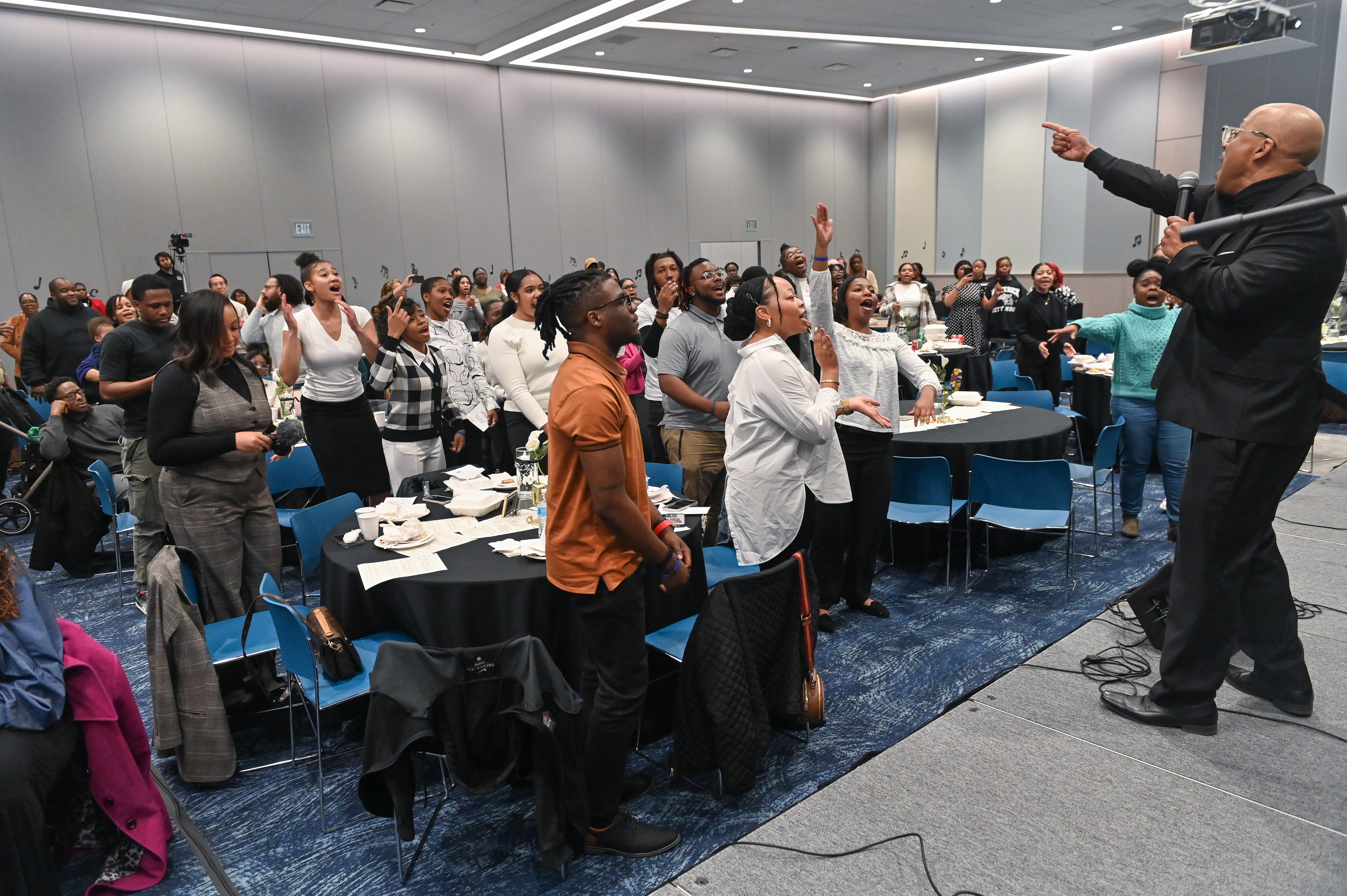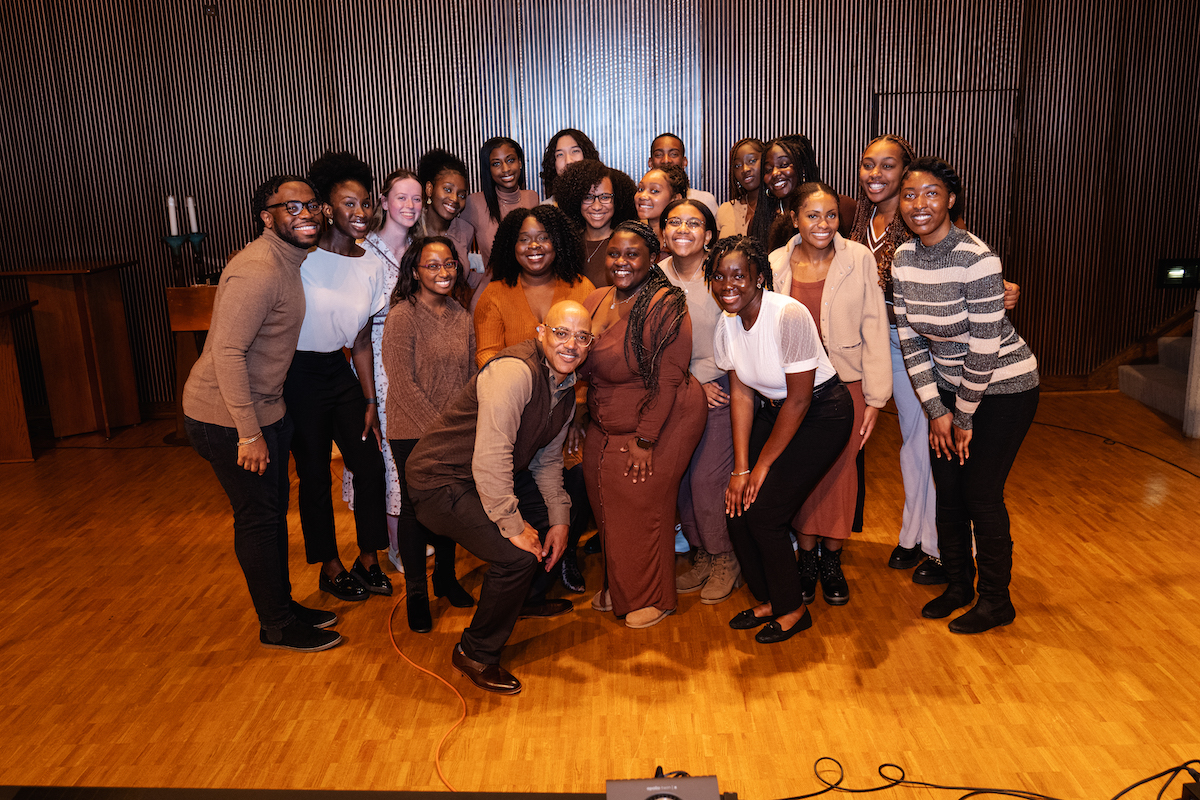Anjulet Tucker believes music has a way of collapsing time.
The evidence, as it pertains to Emory’s storied Voices of Inner Strength Gospel Choir, is right at her fingertips: old concert programs, flyers, group photos, and various other mementos that capture the choir’s long history.
When she touches these delicate artifacts, she can hear the songs through the paper.
Voices of Inner Strength began in 1979. In 1981 it became part of Emory’s Office of Spiritual and Religious Life, and in 1985, the group assumed its current name. In the 40 years since, Voices has performed at worship in Cannon Chapel and important campus events, traveled to sing internationally and even recorded an album.
The Stuart A. Rose Manuscript, Archives and Rare Book Library holds historical records of the choir in its collection of files from the Office of Spiritual and Religious Life.
“It’s nostalgic to go through these memories,” says Tucker, a choir alumna who graduated from Emory in 2000 as an international studies major. She is now director of presidential initiatives and institutional projects in Emory’s Office of the President.
“Voices of Inner Strength was an anchoring part of my Emory student experience,” she says. “When I sang in the choir, I felt connected to my experience of singing in and playing for choirs growing up and to all those who sang before me. Gospel music has the ability to connect people across generations.”
For the last few weeks, Tucker has been culling files to share with choir members past and present. On Friday, Oct. 24, the Office of Spiritual and Religious Life will host a homecoming reception to celebrate the 40th anniversary of the group’s beginnings.
Choir director Maury Allums has been with Voices for more than 30 years. He began accompanying the group in 1992, then under the direction of Charles Westmoreland. In 1996, succeeding Sam Sanders, Allums was named director and has held the position ever since. He became the director of music for the Office of Spiritual and Religious Life in 2017.
“We’ll have students from all eras of the choir at the reception,” Allums says. “It will be a meaningful, multigenerational gathering.”
“Forty in the Bible is a year of testing,” he adds. “To me, that number says we’ve endured a lot.”
The power of music
For Katheryn Prather, a senior majoring in linguistics and creative writing, there’s nothing quite like the gospel practice of “blending.”
“You listen to the other people singing your part and make sure that everyone is matching in style,” she says. “You want everyone’s vowels to sound the same and the timing to be identical. That way, it feels like a singular voice out of many, rather than a bunch of individual voices.”
Blending is a key part of what gives gospel harmonies their unique, spiritual sound.

Maury Allums has been with Voices for more than 30 years, beginning as the choir's director in 1996.
Prather, from Massachusetts, may have honed her blending skills as a member of Voices, but her gospel bonafides go back as far as she can remember.
Her grandmother is a mainstay in her church choir, and several other relatives play in church bands. She’s been singing since childhood.
“Gospel music is something I really love,” Prather says. “And I’ve learned so much from Maury, just in terms of reading spirit and other people and how a choir works together.”
Allums notes that not all members start with Prather’s level of experience. Some, like junior Thomas Wainwright, joined the choir with no gospel background at all.
“I didn’t even sing in high school,” says Wainwright, an Atlanta native majoring in Middle Eastern and South Asian studies. “I was just exploring new and different things when I first got to Emory.”
Wainwright walked in the door because of Allums’ inviting demeanor, but he stayed because he liked what he heard.
“Gospel evokes emotions that other genres just don’t,” Wainwright says. “The choir has become a sanctuary for me.”
Over Allums’ decades on the job, he has learned to work with students of all different backgrounds and experience levels.
“Gospel choirs have changed so much over the years,” he says, noting the fluctuations in choir size and demographics, as well as approaches to sacred music. “My experience has been very rewarding in that the students are constantly teaching me to be a better leader.”
Musically, he says, it’s important to respond to students in the moment — and to involve the audience.
“I don’t present our concerts as listener and performer,” Allums explains. “I present them as one big unit. We’re all part of the gathering. There’s interplay and call and response. If something’s really working for the choir, I’ll turn around and teach that part to the congregation so they can sing with us.”
Those experiences have stayed with alumni, too.
Kristy Jackson, who graduated from Emory in 2002 before attending Morehouse School of Medicine, recalls lively performances at the Goodrich C. White Hall building and local Atlanta churches.
A licensed psychiatrist for nearly 20 years, Jackson hasn’t been an official member of a choir for some time. But last May, thinking of her time with Voices, she surprised her kids by participating in their church’s Mother’s Day concert.
“I’ve been a soprano my whole life,” she says, “but up there I was singing tenor and alto. Friends from Emory asked me, ‘How’d your voice get so deep?’
“I said, ‘These kids did it to me,’” she adds, smiling.

Allums says of the concerts, "If something’s really working for the choir, I’ll turn around and teach that part to the congregation so they can sing with us."
More than just a choir
When Prather first arrived on the Emory campus in 2023, she knew she wanted to join Voices of Inner Strength.
As a self-described introvert, though, she wasn’t sure how she’d fit in.
“I get nervous and quiet in new environments,” Prather says. “When I first showed up to one of the interest meetings, I was initially overwhelmed. But I could immediately tell everyone had a deep connection and that it would be a really wonderful place for me.”
Now she is a part of fostering those connections for others.
“Voices has given me some of my closest friends, and it has been really critical in my formation of community at Emory,” Prather says. “I have been trying to cultivate that same sort of welcoming energy and grounding space for new members.”
Rehearsals are on Friday afternoons, and Allums says the time before and after is designed for fellowship. He encourages interreligious prayer requests and student reflections.

Voices of Inner Strength in fall 2022, one of many close-knit groups throughout the choir's 40-year history.
“I try to create a space for them to come in and be relieved of all the stress they’ve experienced during the week,” he says. “It’s a meditative environment.”
The Rev. Gregory W. McGonigle, Emory dean of religious life and university chaplain, says that sense of fellowship is also present in the group’s community of active alumni, some of whom return to Emory as faculty and staff, like Tucker.
“During the COVID-19 pandemic, we hosted online reunions that brought more than 80 alumni to a Zoom screen,” McGonigle says.
Former Voices member Gregory C. Ellison II, now associate professor of transformative leadership and communal care at the Candler School of Theology, will preach at the homecoming Beloved Community service, where the choir often performs.
When Voices celebrated Allums’ 30th year as director, former members and friends started an endowment, which McGonigle says will “help support concerts forever.”
“It’s an inspiring community over generations,” he adds, “from the founding members to the students involved today.”
Preserving memories for the future
In the archives, Tucker discovered documents that reminded her of the relationships she developed in Voices. She found a letter addressed to one of the choir’s presidents in 1986 from one of her mentors, Bobbi Patterson, former associate university chaplain and dean of students.
“She was writing about the importance of the choir to campus,” Tucker explains.
“I was struck by the host of administrators and community members who helped ensure that the choir had what it needed. Without their material support and encouragement, the choir would not have lasted this long.”
“I’m still trying to process everything I saw in the library,” she adds. “My main thought coming back from there is, ‘What will people see 40 years from now?’ We have our memories, but memories fade. Preservation is important for keeping memory.”
Tucker encourages all alumni who attend the 40th anniversary reception to bring photos and documents of their own to contribute to the archives. There will even be a prize for whoever shows up with the oldest choir T-shirt.
Allums notes there won’t be a full-fledged concert at the event, but that he’d have a hard time preventing the intergenerational group from performing together.
He’s prepared to lead them in a few numbers — and to again inspire the timeless feeling that emerges when making music together.
“You disconnect from the world around you a little bit,” Jackson says of the experience. “You sing the notes. Hopefully they match the notes of the people on your left and on your right. And, through sound, you create something beautiful with your body. What’s better than that?”

